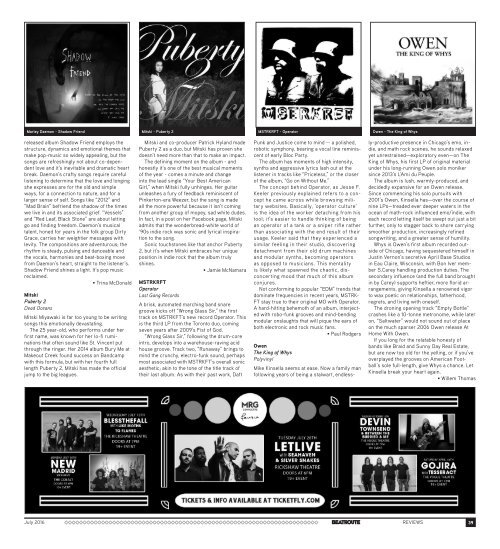BeatRoute Magazine B.C. print e-edition - July 2016
BeatRoute Magazine is a monthly arts and entertainment paper based in Western Canada with a predominant focus on music – local, independent or otherwise.
BeatRoute Magazine is a monthly arts and entertainment paper based in Western Canada with a predominant focus on music – local, independent or otherwise.
You also want an ePaper? Increase the reach of your titles
YUMPU automatically turns print PDFs into web optimized ePapers that Google loves.
Marley Daemon - Shadow Friend<br />
Mitski - Puberty 2<br />
MSTRKRFT - Operator<br />
Owen - The King of Whys<br />
released album Shadow Friend employs the<br />
structure, dynamics and emotional themes that<br />
make pop-music so widely appealing, but the<br />
songs are refreshingly not about co-dependent<br />
love and it’s inevitable and dramatic heart<br />
break. Daemon’s crafty songs require careful<br />
listening to determine that the love and longing<br />
she expresses are for the old and simple<br />
ways, for a connection to nature, and for a<br />
larger sense of self. Songs like “2012” and<br />
“Mad Brain” befriend the shadow of the times<br />
we live in and its associated grief. “Vessels”<br />
and “Red Leaf, Black Stone” are about letting<br />
go and finding freedom. Daemon’s musical<br />
talent, honed for years in the folk group Dirty<br />
Grace, carries her weightier messages with<br />
levity. The compositions are adventurous; the<br />
rhythm is steady, pulsing and danceable and<br />
the vocals, harmonies and beat-boxing move<br />
from Daemon’s heart, straight to the listener’s.<br />
Shadow Friend shines a light. It’s pop music<br />
reclaimed.<br />
• Trina McDonald<br />
Mitski<br />
Puberty 2<br />
Dead Oceans<br />
Mitski Miyawaki is far too young to be writing<br />
songs this emotionally devastating.<br />
The 25 year-old, who performs under her<br />
first name, was known for her lo-fi ruminations<br />
that often sound like St. Vincent put<br />
through the ringer. Her 2014 album Bury Me at<br />
Makeout Creek found success on Bandcamp<br />
with this formula, but with her fourth full<br />
length Puberty 2, Mitski has made the official<br />
jump to the big leagues.<br />
Mitski and co-producer Patrick Hyland made<br />
Puberty 2 as a duo, but Mitski has proven she<br />
doesn’t need more than that to make an impact.<br />
The defining moment on the album - and<br />
honestly it’s one of the best musical moments<br />
of the year - comes a minute and change<br />
into the lead single “Your Best American<br />
Girl,” when Mitski fully unhinges. Her guitar<br />
unleashes a fury of feedback reminiscent of<br />
Pinkerton-era Weezer, but the song is made<br />
all the more powerful because it isn’t coming<br />
from another group of mopey, sad white dudes.<br />
In fact, in a post on her Facebook page, Mitski<br />
admits that the wonderbread-white world of<br />
‘90s indie rock was sonic and lyrical inspiration<br />
to the song.<br />
Sonic touchstones like that anchor Puberty<br />
2, but it’s when Mitski embraces her unique<br />
position in indie rock that the album truly<br />
shines.<br />
• Jamie McNamara<br />
MSTRKRFT<br />
Operator<br />
Last Gang Records<br />
A brisk, automated marching band snare<br />
groove kicks off “Wrong Glass Sir,” the first<br />
track on MSTRKFT’s new record Operator. This<br />
is the third LP from the Toronto duo, coming<br />
seven years after 2009’s Fist of God.<br />
“Wrong Glass Sir,” following the drum-core<br />
intro, develops into a warehouse-raving acid<br />
house groove. Track two, “Runaway” brings to<br />
mind the crunchy, electro-funk sound, perhaps<br />
most associated with MSTRKFT’s overall sonic<br />
aesthetic; akin to the tone of the title track of<br />
their last album. As with their past work, Daft<br />
Punk and Justice come to mind -- a polished,<br />
robotic symphony, bearing a vocal line reminiscent<br />
of early Bloc Party.<br />
The album has moments of high intensity,<br />
synths and aggressive lyrics lash out at the<br />
listener in tracks like “Priceless,” or the closer<br />
of the album, “Go on Without Me.”<br />
The concept behind Operator, as Jesse F.<br />
Keeler previously explained refers to a concept<br />
he came across while browsing military<br />
websites. Basically, ‘operator culture’<br />
is the idea of the worker detaching from his<br />
tool; it’s easier to handle thinking of being<br />
an operator of a tank or a sniper rifle rather<br />
than associating with the end result of their<br />
usage. Keeler said that they experienced a<br />
similar feeling in their studio, discovering<br />
detachment from their old drum machines<br />
and modular synths, becoming operators<br />
as opposed to musicians. This mentality<br />
is likely what spawned the chaotic, disconcerting<br />
mood that much of this album<br />
conjures.<br />
Not conforming to popular “EDM” trends that<br />
dominate frequencies in recent years, MSTRK-<br />
FT stay true to their original MO with Operator.<br />
A hard-hitting behemoth of an album, interjected<br />
with robo-funk grooves and mind-bending<br />
modular onslaughts that will pique the ears of<br />
both electronic and rock music fans.<br />
• Paul Rodgers<br />
Owen<br />
The King of Whys<br />
Polyvinyl<br />
Mike Kinsella seems at ease. Now a family man<br />
following years of being a stalwart, endlessly-productive<br />
presence in Chicago’s emo, indie,<br />
and math rock scenes, he sounds relaxed<br />
yet unrestrained—exploratory even—on The<br />
King of Whys, his first LP of original material<br />
under his long-running Owen solo moniker<br />
since 2013’s L’Ami du Peuple.<br />
The album is lush, warmly-produced, and<br />
decidedly expansive for an Owen release.<br />
Since commencing his solo pursuits with<br />
2001’s Owen, Kinsella has—over the course of<br />
nine LPs—treaded ever deeper waters in the<br />
ocean of math-rock influenced emo/indie, with<br />
each record letting itself be swept out just a bit<br />
further, only to stagger back to shore carrying<br />
smoother production, increasingly refined<br />
songwriting, and a greater sense of humility.<br />
Whys is Owen’s first album recorded outside<br />
of Chicago, having sequestered himself in<br />
Justin Vernon’s secretive April Base Studios<br />
in Eau Claire, Wisconsin, with Bon Iver member<br />
S.Carey handling production duties. The<br />
secondary influence (and the full band brought<br />
in by Carey) supports heftier, more florid arrangements,<br />
giving Kinsella a renowned vigor<br />
to wax poetic on relationships, fatherhood,<br />
regrets, and living with oneself.<br />
The droning opening track “Empty Bottle”<br />
crashes like a 10-tonne metronome, while later<br />
on, “Saltwater” would not sound out of place<br />
on the much sparser 2006 Owen release At<br />
Home With Owen.<br />
If you long for the relatable honesty of<br />
bands like Braid and Sunny Day Real Estate,<br />
but are now too old for the yelling, or if you’ve<br />
overplayed the grooves on American Football’s<br />
sole full-length, give Whys a chance. Let<br />
Kinsella break your heart again.<br />
• Willem Thomas<br />
<strong>July</strong> <strong>2016</strong> REVIEWS<br />
39


















